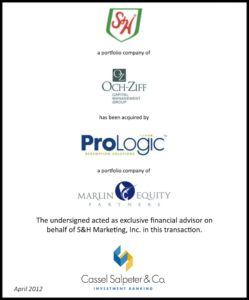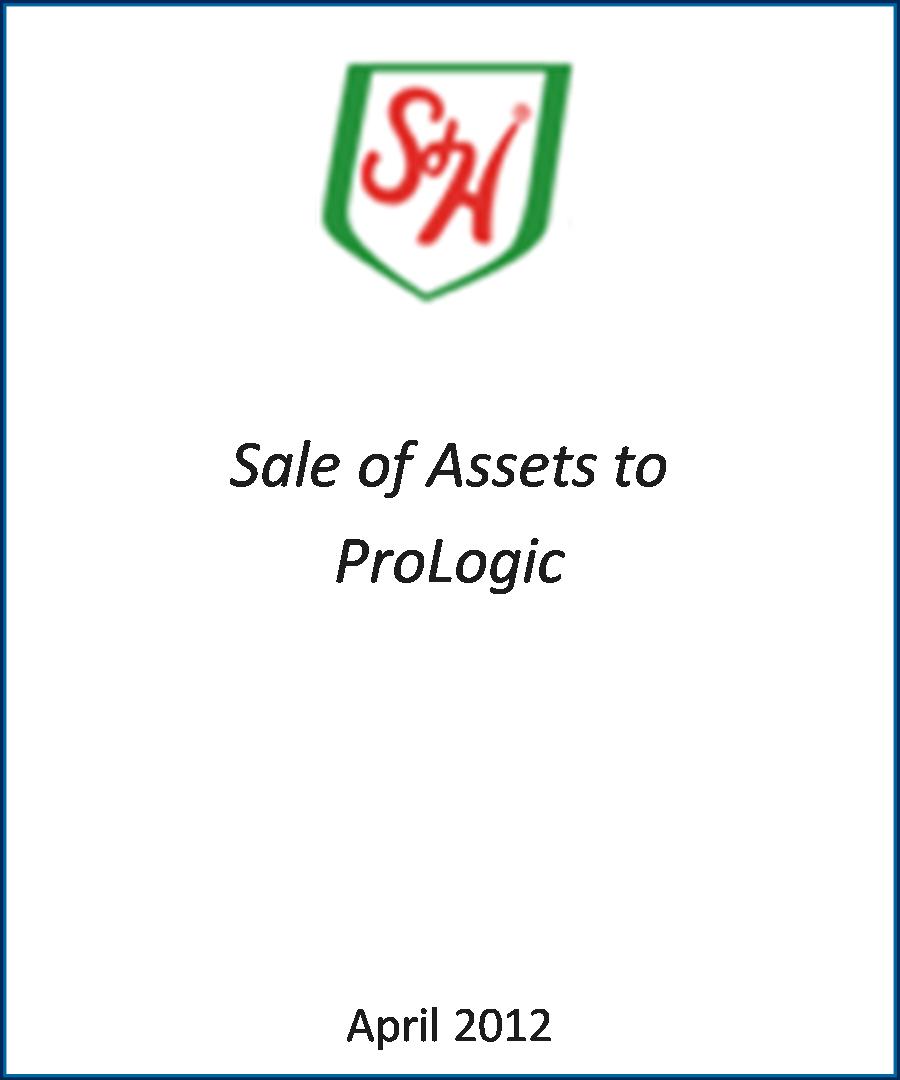Family Business Sales Can Be Emotional
To view original article click here.
Decisions about the future of a company can be a source of great stress and family conflict.
By: James Cassel
MIAMI, Florida, April 15, 2012 – Between 80 and 90 percent of all U.S. companies are family businesses, according to the Family Business Review. Over the course of the next decade, more than 40 percent of those companies’ top executives will retire, making family business succession a major issue for thousands of enterprises and thousands of families.
With this massive change on the horizon, it’s safe to assume many of these companies will address succession by selling the family business or transitioning to the next generation. In addition, many family businesses contemplate a sale for myriad other reasons besides succession. Regardless of the motivation, selling may not be the right choice. And for those business owners who choose to sell, the process can be a source of great stress and family conflict.
Here are five questions to help your family-owned company navigate the prospect and process of selling.
1. Why are you considering a sale?
It’s important to identify the reasons why you want to sell the business, because the motivation for a sale can have a large impact on the best course of action to take. For instance, if there’s not another family member or generation in line to take over the business, then a sale may be the best way to monetize your asset. By contrast, market opportunities may be the driving force, making the urgency for a sale more present. Other criteria could include divorce, death, family members’ seeking alternative career directions, or tax and estate planning considerations.
2. Is an outright sale the best choice?
Before hanging the “for sale” sign, consider strategic alternatives. In this regard, consult with your accountant, your attorney, or an investment banker. Depending on your goals, there may be a number of other options available to meet your family’s objectives.
For instance, recapitalizing the company could provide cash to the exiting generation (or exiting family members) while allowing the remaining family members to continue in management roles. If liquidity is not an issue, then identifying non-family members for executive management positions can address succession issues while allowing the family to retain ownership (and therefore the cash flow). And of course, if a sale does make sense, then be certain to engage the appropriate professional advisors to ensure you realize the greatest possible value from your family business as early as possible.
3. Are your decisions driven by emotions or good business sense?
Despite the prevalence of family members that work together, few can avoid the potential divisiveness that money and business dealings can have on their relationships. Whether it’s a case of siblings facing off with each other, cousins in conflict, or parents and children disagreeing, the emotions of a family quarrel can lead to bad decision-making that can have catastrophic economic impact on a family business. I have seen this more than once: As a result of ego clashes or a lack of common sense, much money is left on the table. And once again, one of the best defenses a family can take is to engage the right assistance. A corporate psychologist, family therapist, or professional mediator can often prevent emotions from hijacking a family business’ potential and ensure that equity and “cool heads” prevail.
Emotions can also affect owners’ sense of what a business is worth. While your business is your baby, prospective buyers are often uninterested in the characteristics you consider most significant. Many buyers are extremely disciplined in their approach to value. Look to your advisors to provide an accurate valuation and to negotiate without bias.
4. Are family members on the same page?
Families sometimes struggle during a sale because some members are risk takers and others are more conservative. One owner (or group of owners) may want to hold out for a premium price while another owner may want to take the first offer. As a seller, the investment bankers representing your company should engage all of the selling parties before going to market to ensure that everyone is on the same page, speaking with one voice and mindful of the same goals. Sometimes it might even be better if one family member buys out the other if that person will be an obstacle in the sale process.
5. Are you ready for what comes next?
The excitement of a deal and the lure of what looks like a windfall can distract business owners from the reality that, after a transaction, they will no longer own and control their family business. What will you do with your proceeds? What will you do with your time? Many successful small business owners aren’t ready to wind down after selling their companies, and they sorely miss the stimulation of running a company. They still want to be in the game. For other family business owners, a sale can mean their children, siblings, or spouses are left without a job. Still, for others a sale can mean their legacy becomes uncertain.
It’s helpful to contemplate and visualize how you and your entire family will move forward after the sale of your family business.
Cassel Salpeter & Co., LLC, Names Philip Cassel Associate
MIAMI — April 12, 2012 — Cassel Salpeter & Co., a growing independent investment banking firm, recently hired Philip Cassel to its professional staff. Philip will serve as an Associate and will focus on M&A and restructuring assignments.
“Philip’s wide range of expertise is particularly useful at a firm like ours,” saidJames Cassel, the company’s chairman and co-founder. “His background is exactly what we need to help our clients handle complex transactions.”
Philip, a graduate of Massachusetts Institute of Technology, previously held the positions of Associate at Rialto Capital Finance Group (a wholly owned subsidiary of public homebuilder Lennar Corporation) and Analyst at Alvarez & Marsal. In addition to his work in restructuring and private equity, Philip has also assisted with cash flow modeling, budget planning, and court filings.
“I am looking forward to working with a growing investment banking firm in Miami, especially one that gives me an opportunity to work alongside my father,” Philip added.
About Cassel Salpeter & Co., LLC
Cassel Salpeter & Co., LLC is a middle market investment bank focused on providing independent and objective advice to middle market and emerging growth companies. Our investment banking and advisory services include broad capabilities for both private and public companies: Mergers and Acquisitions; Restructurings, including 363 Sales and Plans of Reorganization; Equity and Debt Capital Raises; Fairness and Solvency Opinions; Valuations; and Financial and Strategic Advisory.
Our senior partners are personally involved at every stage of all assignments. Our success is based on unbiased advice; understanding each client’s business objectives; providing value added services; and our extensive relationships and expertise. We have forged relationships and executed transactions nationally and internationally.
Headquartered in Miami, Florida, Cassel Salpeter is led by James Cassel and Scott Salpeter. Member FINRA and SIPC.
S&H Solutions has been acquired by ProLogic Redemption Solutions
 Background: Headquartered in Delray Beach, FL, S&H Solutions provides a software loyalty platform that enables retailers to create, manage, and enhance customer loyalty programs anddeliver real-time, personalized marketing and shopper insights. The Company is a descendant of S&H Green stamps, widely known as the original loyalty marketing program that distributed billions of stamps that consumers collected and redeemed for merchandise.
Background: Headquartered in Delray Beach, FL, S&H Solutions provides a software loyalty platform that enables retailers to create, manage, and enhance customer loyalty programs anddeliver real-time, personalized marketing and shopper insights. The Company is a descendant of S&H Green stamps, widely known as the original loyalty marketing program that distributed billions of stamps that consumers collected and redeemed for merchandise.
- Cassel Salpeter:
- Was mandated to sell S&H on behalf of the parent Company
- Ran a competitive sales process, identifying and contacting over 100 strategic and financial parties
- Challenges:
- Potential contingent liabilities
- Changing business model towards SaaS based revenue
- S&H business relationship with parent’s other businesses
- Non-core operation of parent, operating within a rapidly changing technology environment
- Outcome: In April 2012, S&H Solutions was sold to ProLogic Redemption Solutions, a portfolio company of Marlin Equity Partners and one of the industry’s largest clearinghouses for manufacturer coupons.

Get In Touch
Cassel Salpeter & Co.
801 Brickell Avenue,
Suite 1900
Miami, FL 33131
(305) 438-7700
Stay Informed
Sign up today for insights and growth strategies.
Subscribe Now



